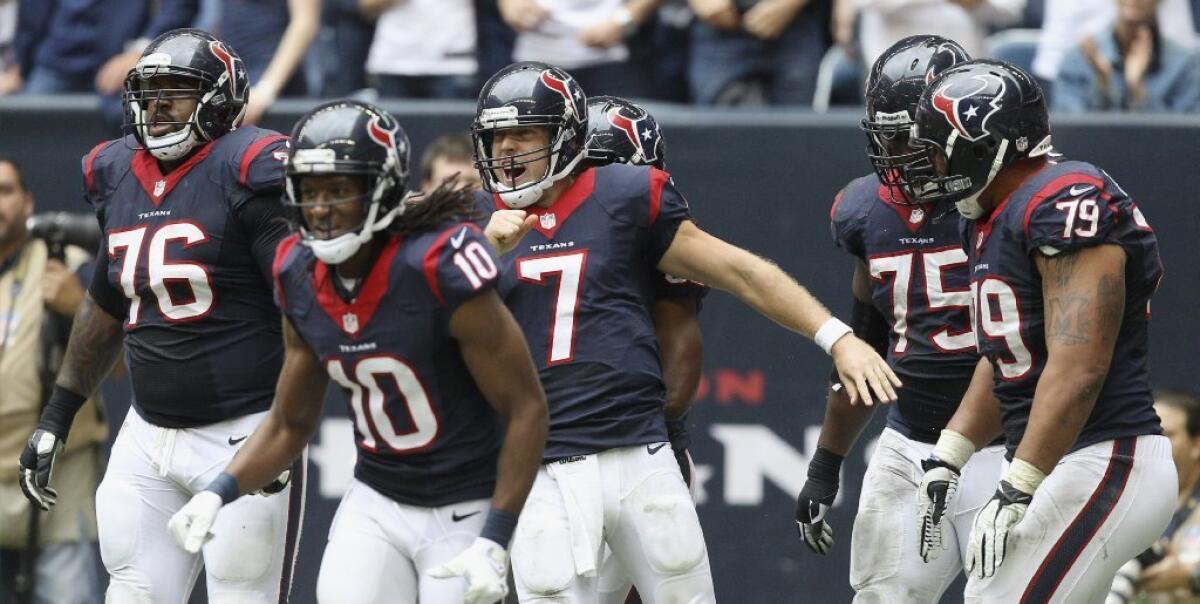The NFL, sacrificing its players for Thursday night cash

It may be the sheer awfulness of this Thursday’s National Football League matchup, featuring the Houston Texans at the Jacksonville Jaguars -- two going-nowhere teams with five wins and 19 losses between them -- but the NFL’s greedy push to load up its Thursday night schedule is getting a closer look from sportswriters and fans.
Nobody likes what they see.
The latest to weigh in is Sports Illustrated’s Robert Klemko, who documents the fear and trembling of the players entering these contests on short rest from Sunday. “It’s dangerous,” Texans tackle Duane Brown told him. “It feels horrible.”
As Klemko observes, the league expanded its one-game Thanksgiving Day tradition to a slate of eight games on Thursdays in 2006 (aired on its NFL Network), and expanded it further to 14 games last year. This year, 16 games will be played on Thursdays, including three on Thanksgiving. Don’t expect the trend to end there. That’s because the league’s goal is to sell a slate of Thursday games to a broadcast bidder. Adding a second Thursday game per week would provide the necessary inventory without cutting into the NFL Network’s schedule.
The broadcast money being talked about is in the neighborhood of $700 million a year, which would just about cover in a single swipe the $765-million settlement the NFL signed with players suffering from concussions. Actually, more than cover it, because some of the $765 million may be illusory and most is to be paid out over years.
The irony is that as much as the league claimed the settlement attested to its concern for its players’ health (not that many people believed that), critics argue that the Thursday night games are endangering the players’ health.
The league has statistics showing that the injury rate in Thursday night games is right in line with the rates on Sunday, but that could be misleading. Football injuries tend to be cumulative, and a tough game played on a short week, before the body has a chance to recover, can yield its baleful influence down the line. (That’s one complaint heard by Klemko.)
A possible data point involves Baltimore Ravens star linebacker Ray Lewis. Last year, the Ravens opened the season playing four games in 17 days, including one Monday night game and one on Thursday. Two weeks later, he suffered an injury that knocked him out of the regular season; he returned for the playoffs and Super Bowl and then retired.
Nor is Thursday night a fan’s paradise. Games played by two exhausted teams, one of which may have traveled clear across the country, tend to be tired, conservative, fumble-, interception-, and penalty-plagued affairs. Does the NFL care about the quality of play on the field? This is the league that staffed regular-season games with replacement refs for three weeks last year, so draw your own conclusions.
Moreover, the bad games are still ratings bonanzas; even this Thursday’s likely snoozer is expected to draw 8 million viewers. That’s like catnip to possible bidders such as Fox, NBC and ESPN, who would lust after the chance to sell space to advertisers hoping to reach the predominately male audience of live sports. And vigorous bidding means visions of dollar signs for NFL owners. That’s what’s driving this trend. If you think that the prospect of more injuries or lousier games trumps money, you don’t know your NFL.
More to Read
Go beyond the scoreboard
Get the latest on L.A.'s teams in the daily Sports Report newsletter.
You may occasionally receive promotional content from the Los Angeles Times.











